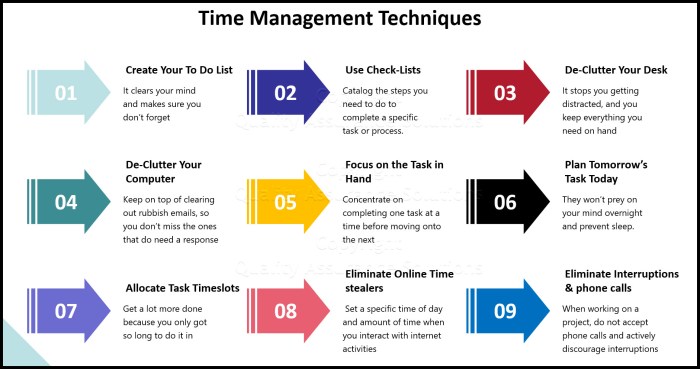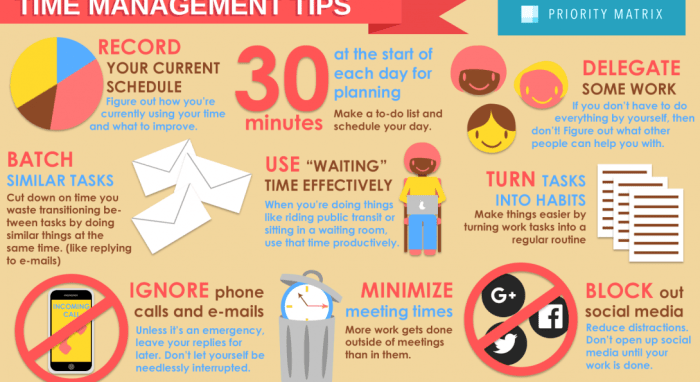Time Management Tips takes center stage in this guide, offering a fresh perspective on how to ace your time management game like a boss. Get ready to level up your productivity and kick stress to the curb!
In a world filled with distractions and deadlines, mastering the art of time management is the key to unlocking your full potential. Let’s dive into the strategies and tools that can revolutionize the way you approach your daily tasks.
Importance of Time Management: Time Management Tips
Time management is crucial in both personal and professional settings as it helps individuals prioritize tasks, meet deadlines, and achieve goals efficiently. Effective time management not only boosts productivity but also reduces stress levels, leading to a better work-life balance.
Benefits of Effective Time Management
- Increased productivity: Proper time management allows individuals to focus on important tasks, leading to better work output in less time.
- Reduced stress levels: By organizing and planning their time effectively, individuals can avoid last-minute rushes and frantic deadlines, reducing stress and anxiety.
- Improved decision-making: When time is managed well, individuals have the space to make thoughtful decisions without feeling rushed or overwhelmed.
Examples of Poor Time Management Effects
- Missed deadlines: Poor time management can result in missed deadlines, leading to negative consequences such as delayed projects or lost opportunities.
- Procrastination: Putting off important tasks due to poor time management can create a cycle of stress and inefficiency, affecting overall performance.
- Overwhelming workload: Without proper time management, individuals may find themselves overwhelmed with tasks, leading to burnout and decreased motivation.
Strategies for Effective Time Management
Effective time management is crucial for success in any endeavor. By utilizing proven strategies and techniques, individuals can optimize their productivity and achieve their goals efficiently. Here are some key strategies to help you manage your time effectively:
The Pomodoro Technique
The Pomodoro Technique is a popular time management method that involves breaking work into intervals, typically 25 minutes in length, separated by short breaks. This technique helps improve focus and productivity by allowing individuals to work in short, concentrated bursts. By setting a timer and committing to a task for a specific period, you can avoid distractions and maintain momentum throughout your work session.
Setting SMART Goals, Time Management Tips
Setting SMART goals is essential for effective time management. SMART goals are Specific, Measurable, Achievable, Relevant, and Time-bound. By defining clear objectives that meet these criteria, individuals can prioritize their tasks and track their progress effectively. SMART goals provide a roadmap for success and help ensure that your time is spent on activities that align with your priorities.
Prioritizing Tasks
Prioritizing tasks based on urgency and importance is key to effective time management. By categorizing your tasks into different levels of priority, such as high, medium, or low, you can focus on what needs to be done first and allocate your time accordingly. Utilize tools like to-do lists or task management apps to organize your responsibilities and ensure that you address the most critical tasks in a timely manner.
Tools and Apps for Time Management

In today’s digital age, there are numerous tools and apps available to help individuals better manage their time and increase productivity. These tools can assist in organizing schedules, setting priorities, and tracking progress towards goals. Let’s explore some popular time management tools and apps that can make a significant difference in how you manage your time effectively.
Trello
Trello is a popular project management tool that uses boards, lists, and cards to organize tasks and projects. Users can create boards for different projects, add tasks to lists, and move cards across lists to track progress. Trello also allows for collaboration with team members, making it a versatile tool for both personal and professional use.
Todoist
Todoist is a powerful task management app that helps users stay organized and on top of their to-do lists. Users can create tasks, set due dates, prioritize items, and categorize tasks into projects. Todoist also offers features like recurring tasks, reminders, and productivity tracking to help users manage their time efficiently.
Google Calendar
Google Calendar is a popular calendar app that allows users to schedule events, set reminders, and share calendars with others. Users can create multiple calendars for different aspects of their lives, color code events, and receive notifications for upcoming appointments. Google Calendar syncs across devices, making it easy to access your schedule from anywhere.
Overall, these tools and apps can help individuals streamline their workflow, prioritize tasks, and make the most of their time. By utilizing technology to aid in time management, individuals can improve their productivity and achieve their goals more effectively.
Overcoming Procrastination
Procrastination is a common issue that many people face when trying to manage their time effectively. It can lead to stress, missed deadlines, and a decrease in productivity. However, there are strategies that can help you overcome procrastination and get tasks done.
Break Tasks into Smaller Steps
When faced with a daunting task, it can be tempting to put it off. To avoid procrastination, break tasks into smaller, more manageable steps. This way, you can focus on completing one step at a time, making the overall task seem less overwhelming.
- Start by outlining the steps needed to complete the task.
- Set achievable goals for each step to track your progress.
- Celebrate small victories along the way to stay motivated.
Create a Conducive Work Environment
Creating a work environment that minimizes distractions and enhances focus can help you overcome procrastination.
Eliminate clutter on your workspace to reduce visual distractions.
Set specific work hours and stick to them to establish a routine.
Use noise-canceling headphones or background music to block out distractions.
Time Management at Work

Effective time management is crucial for career growth and success in the workplace. It allows individuals to prioritize tasks, meet deadlines, and deliver high-quality work consistently. By managing time efficiently, employees can increase productivity, reduce stress, and improve overall job performance.
Strategies for Balancing Multiple Projects and Deadlines
When juggling multiple projects and deadlines at work, it is essential to prioritize tasks based on urgency and importance. Creating a detailed schedule or to-do list can help individuals stay organized and focused. Break down complex projects into smaller, manageable tasks and allocate time accordingly. Utilizing project management tools and techniques can also streamline workflow and improve efficiency.
- Set clear goals and deadlines for each project.
- Prioritize tasks based on deadlines and importance.
- Use time blocking to allocate specific time slots for different projects.
- Communicate effectively with team members to coordinate efforts and avoid conflicts.
Tips for Delegating Tasks and Managing Time Efficiently
Delegating tasks to team members can help distribute workload and improve efficiency in the workplace. Effective delegation involves assigning tasks to individuals with the right skills and providing clear instructions and expectations. By empowering team members to take on responsibilities, managers can focus on high-priority tasks and strategic initiatives.
- Identify tasks that can be delegated to others.
- Communicate clearly and provide necessary resources for successful task completion.
- Follow up on delegated tasks to ensure progress and address any issues promptly.
- Trust team members to deliver results and provide feedback and recognition for their efforts.
Time Management in Personal Life
Effective time management is not just crucial for work but also plays a significant role in maintaining a healthy work-life balance. By managing your time efficiently, you can create more opportunities to focus on personal aspects of your life, such as self-care, hobbies, and relaxation.
Scheduling Personal Time
Scheduling time for self-care, hobbies, and relaxation is essential for overall well-being. It is important to prioritize activities that bring you joy and rejuvenate your mind and body. By incorporating these activities into your daily or weekly schedule, you can ensure that you are taking care of yourself amidst your busy professional life.
- Set aside specific time slots for activities that help you relax and unwind, such as reading a book, practicing yoga, or going for a walk.
- Make self-care a non-negotiable part of your routine to recharge and reduce stress levels.
- Engage in hobbies that bring you happiness and fulfillment, whether it’s painting, cooking, or playing a musical instrument.
Managing Personal Commitments
Balancing personal commitments alongside professional responsibilities can be challenging, but with effective time management, it is possible to juggle both successfully. It’s crucial to prioritize tasks based on their importance and allocate time accordingly to ensure that personal commitments are not neglected.
- Use a planner or calendar to keep track of important dates and events, including birthdays, anniversaries, and social gatherings.
- Communicate openly with family and friends about your schedule to ensure that you can fulfill your personal commitments without compromising your work responsibilities.
- Delegate tasks when necessary and learn to say no to additional commitments that may overwhelm your schedule.
